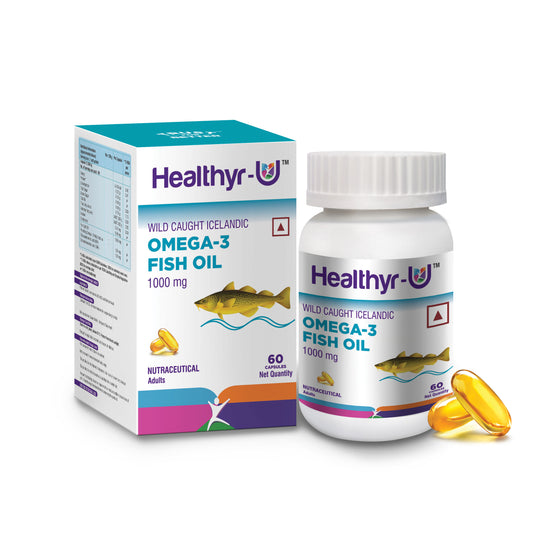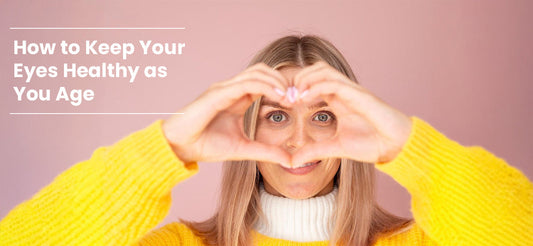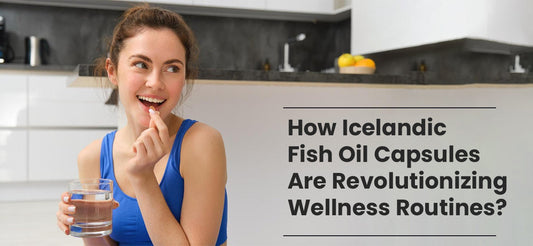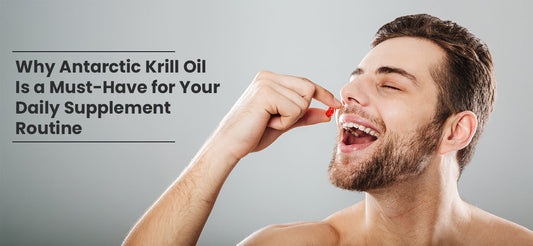Your eyes are complex organs that require essential nutrients to function optimally. Maintaining good eye health goes beyond regular check-ups and involves ensuring that you get the right nutrition.
In this blog, we will understand how nutrition for your eyes can influence your vision, the role of antioxidants in protecting your eyes, and the importance of vitamins and supplements in preventing common eye issues.
Why is Nutrition for Eyes Important?
Proper nutrition plays a key role in protecting your vision and preventing eye diseases. Like other parts of the body, your eyes need specific nutrients to fight oxidative stress and maintain their structure and function. Nutrients such as antioxidants help prevent damage caused by free radicals, which can accelerate eye aging and increase the risk of conditions like cataracts and macular degeneration1.
When considering nutrition for the eyes, including a variety of fruits, vegetables, and essential fatty acids is critical. However, modern diets often fall short in providing all the required vitamins for eye health, making eye health supplements an effective way to fill these gaps.
The Role of Antioxidants in Eye Health
Antioxidants are compounds that neutralize free radicals, reducing oxidative damage in eye tissues. These molecules play a vital role in preventing common eye diseases, including cataracts and age-related macular degeneration (AMD). Some of the most beneficial antioxidants for the eyes include:
• Lutein and Zeaxanthin:
Found in leafy greens and eggs, these carotenoids accumulate in the retina and lens, filtering harmful blue light and preventing damage2.
• Vitamin C:
This water-soluble antioxidant protects the eye lens from oxidative stress and supports healthy blood vessels in the eyes3.
• Vitamin E:
Helps prevent cell damage and supports long-term eye health by reducing the risk of age-related macular degeneration4.
• Zinc:
Plays a crucial role in transporting vitamin A from the liver to the retina, where it helps produce melanin, a pigment that protects the eyes5.
Taking antioxidants through both food sources and eye health supplements is an effective way to maintain clear vision and prevent long-term damage.
Key Vitamins for Eye Health and Their Benefits
Vitamins are essential for keeping your eyes healthy and preventing issues like dryness, allergies, and infections. Here are some of the most important vitamins for eye health:
-
Vitamin A:
Supports good night vision and reduces the risk of dry eyes and conjunctivitis. It is found in carrots, papaya, leafy vegetables, sweet potatoes, and liver.11
-
Vitamin C:
Helps prevent cataracts and promotes healthy blood vessels in the eyes. Citrus fruits, berries, kiwi, amla, guava, and bell peppers are excellent sources.3
-
Vitamin E:
Protects the eyes from free radical damage and supports long-term vision. Nuts, seeds, and vegetable oils are good sources.4
-
B Vitamins:
Help lower the risk of macular degeneration and alleviate symptoms of eye allergies. B vitamins are present in whole grains, legumes, and leafy vegetables.12
Including these vitamins through food or supplements ensures that your eyes get the nutrients they need to stay healthy. If dietary intake is insufficient, using the best supplement for eyesight improvement can offer significant benefits.
Preventing Eye Diseases with Good Nutrition and Antioxidants
A healthy diet rich in antioxidants can protect your eyes from several diseases. Below are some common eye conditions and how nutrition can help prevent or manage them:
-
Age-related macular Degeneration (AMD):
This condition affects the central vision and is a leading cause of vision loss in older adults. Antioxidants like lutein, zeaxanthin, and zinc can help slow the progression of AMD6.
-
Cataracts:
Oxidative damage to the eye’s lens can lead to cataracts, causing cloudy vision. Antioxidants, especially vitamins C and E, play a role in reducing the risk of cataracts7.
-
Conjunctivitis:
Also known as pink eye, conjunctivitis is an eye infection that causes redness and irritation. Vitamins A and C boost immune function, helping to reduce the risk of infections8.
-
Eye Allergies:
Nutrients like vitamin C and omega-3 fatty acids help alleviate symptoms of eye allergies by reducing inflammation and boosting immunity9.
Incorporating antioxidants and vitamins through both food and eye health supplements can reduce the likelihood of developing these eye diseases.
Tips to Maintain Eye Health with a Balanced Diet13
Good eye care starts with consuming the right nutrients regularly. Below are dietary tips to maintain eye health and reduce the risk of vision problems:
-
Eat Leafy Greens and Vegetables
Spinach, mustard leaves, and broccoli are packed with lutein and zeaxanthin, which protect the retina and improve overall eye vision.
-
Add Omega-3 Fatty Acids to Your Diet
Fatty fish like salmon and mackerel contain essential omega-3s, which help prevent dry eyes and reduce inflammation, promoting better eye health.
-
Incorporate Citrus Fruits and Berries
These are rich in vitamin C, which helps protect the eyes from oxidative stress and keep the blood circulation healthy.
-
Use the Best Supplement for Eyesight Improvement
If your diet lacks essential nutrients, consider adding a supplement formulated for vision support. Look for one containing antioxidant such as lutein, zeaxanthin, and vitamins A, C, and E.
Importance of Regular Eye Check-Ups
While good nutrition plays a crucial role in maintaining eye health, regular eye check-ups are equally important. Early detection of eye diseases like AMD, glaucoma, or cataracts ensures timely intervention, which can preserve vision. Even if you have no noticeable symptoms, annual check-ups are a critical part of preventive eye care.
Eye check-ups also provide an opportunity to discuss any symptoms, such as eye allergies or vision changes, with your eye care professional. This helps ensure you receive the appropriate care and guidance on using the right eye health supplements if needed.
Maintaining good eye vision and preventing common eye diseases requires a combination of proper nutrition, antioxidants, and regular check-ups. Including essential vitamins for eye health in your diet and taking the best supplement for eyesight improvement can help protect your eyes from oxidative damage and support long-term health10.
By following a balanced diet rich in antioxidants, staying hydrated, and getting regular eye check-ups, you can take control of your vision and ensure optimal eye health. Prioritizing both nutrition and preventive care will keep your eyes healthy, reducing the risk of conditions like conjunctivitis, cataracts, and age-related vision loss.
Remember, good eye care is not just about addressing issues when they arise but about maintaining the right balance of nutrients to protect your vision for years to come.
References
- Lawrenson, J. G., & Downie, L. E. (2019). Nutrition and eye health. Nutrients, 11(9), 2123. https://doi.org/10.3390/nu11092123
- Kijlstra, A., Tian, Y., Kelly, E. R., & Berendschot, T. T. (2012). Lutein: More than just a filter for blue light. Progress in Retinal and Eye Research, 31(4), 303–315. https://doi.org/10.1016/j.preteyeres.2012.03.002
- Lim, J. C., Arredondo, M. C., Braakhuis, A. J., & Donaldson, P. J. (2020). Vitamin C and the Lens: New Insights into Delaying the Onset of Cataract. Nutrients, 12(10), 3142. https://doi.org/10.3390/nu12103142
- Edwards, G., Olson, C. G., Euritt, C. P., & Koulen, P. (2022). Molecular mechanisms underlying the therapeutic role of Vitamin E in Age-Related Macular Degeneration. Frontiers in Neuroscience, 16. https://doi.org/10.3389/fnins.2022.890021
- Hale, L. P. (2002). Zinc α-2-glycoprotein Regulates Melanin Production by Normal and Malignant Melanocytes. Journal of Investigative Dermatology, 119(2), 464–470. https://doi.org/10.1046/j.1523-1747.2002.01813.x
- Mrowicka, M., Mrowicki, J., Kucharska, E., & Majsterek, I. (2022). Lutein and zeaxanthin and their roles in Age-Related Macular Degeneration—Neurodegenerative disease. Nutrients, 14(4), 827. https://doi.org/10.3390/nu14040827
- Gritz, D. C., Srinivasan, M., Smith, S. D., Kim, U., Lietman, T. M., Wilkins, J. H., Priyadharshini, B., John, R. K., Aravind, S., Prajna, N. V., Thulasiraj, R. D., & Whitcher, J. P. (2006). The Antioxidants in Prevention of Cataracts Study: effects of antioxidant supplements on cataract progression in South India. British Journal of Ophthalmology, 90(7), 847–851. https://doi.org/10.1136/bjo.2005.088104
-
Conjunctival and tear film changes after vitamin C and E administration in non-insulin dependent diabetes mellitus. (2004, May 1). PubMed. https://pubmed.ncbi.nlm.nih.gov/15114272/
- Kangari, H., Eftekhari, M. H., Sardari, S., Hashemi, H., Salamzadeh, J., Ghassemi-Broumand, M., & Khabazkhoob, M. (2013). Short-term consumption of oral omega-3 and dry eye syndrome. Ophthalmology, 120(11), 2191–2196. https://doi.org/10.1016/j.ophtha.2013.04.006
- Das, S., & Roy, S. (2024). THE ROLE OF NUTRITION IN EYE HEALTH: A COMPREHENSIVE REVIEW. Journal of Population Therapeutics and Clinical Pharmacology. https://doi.org/10.53555/jptcp.v31i6.6667
- Vitamin A: Vitamins and minerals https://www.nhs.uk/conditions/vitamins-and-minerals/vitamin-a/#:~:text=You%20can%20also%20get%20vitamin%20A%20by,fruit%2C%20such%20as%20mango%2C%20papaya%20and%20apricots. Last accessed 16th January 2025
- Merle BMJ, Barthes S, Féart C, Cougnard-Grégoire A, Korobelnik JF, Rougier MB, Delyfer MN, Delcourt C. B Vitamins and Incidence of Advanced Age-Related Macular Degeneration: The Alienor Study. Nutrients. 2022 Jul 8;14(14):2821. doi: 10.3390/nu14142821. PMID: 35889778; PMCID: PMC9318446.
- Khadamy J. Nutrients for Eye Health and Disease Management. Available at https://www.researchgate.net/profile/Joobin-Khadamy/publication/376582120_Nutrients_for_Eye_Health_and_Disease_Management/links/657df780aff8b16813ad8fda/Nutrients-for-Eye-Health-and-Disease-Management.pdf












